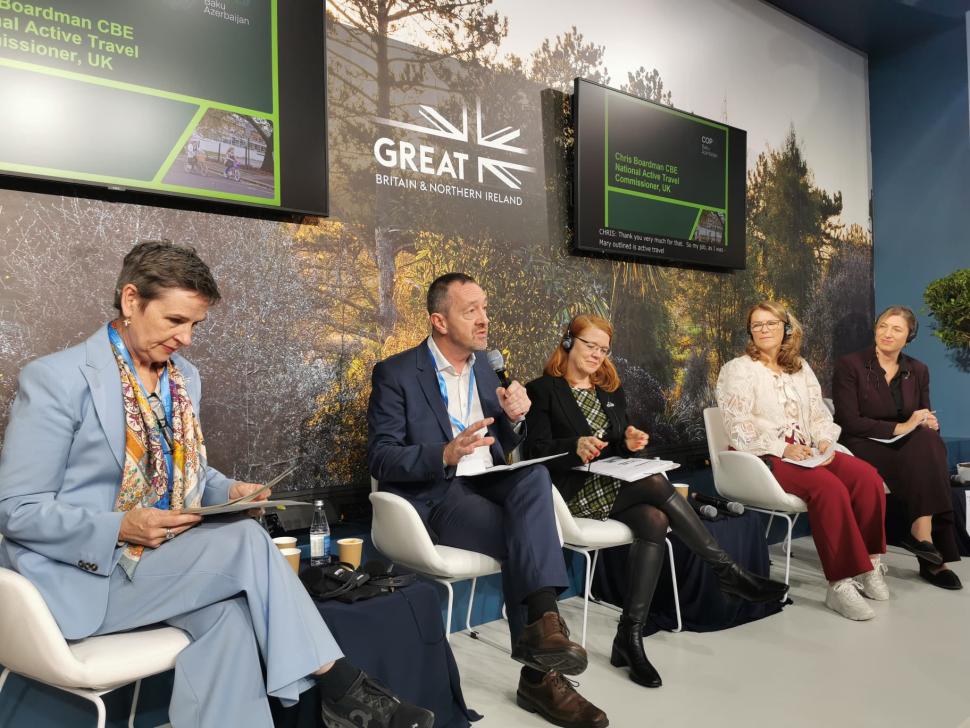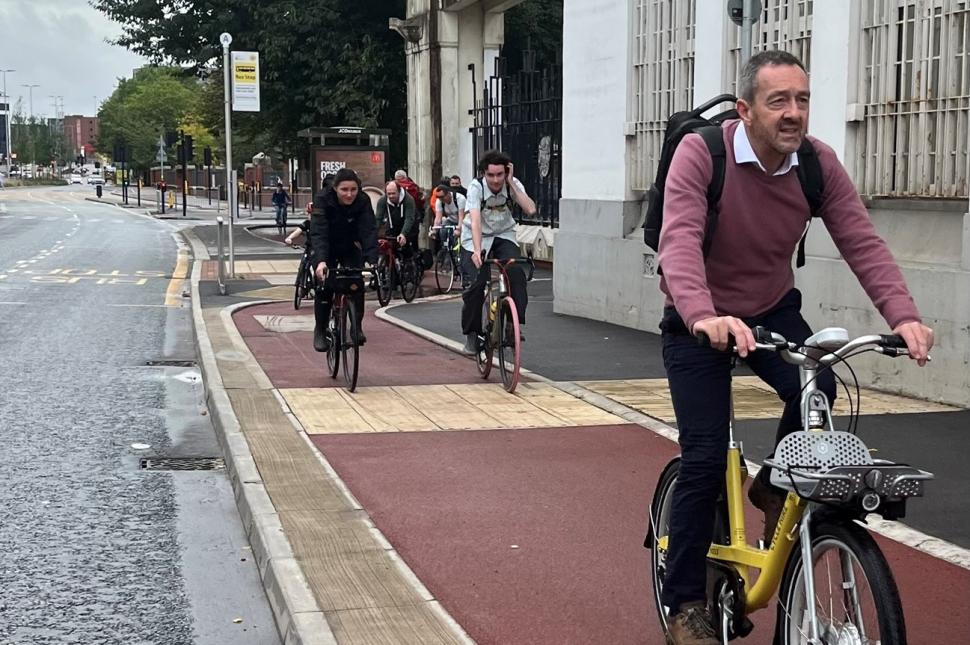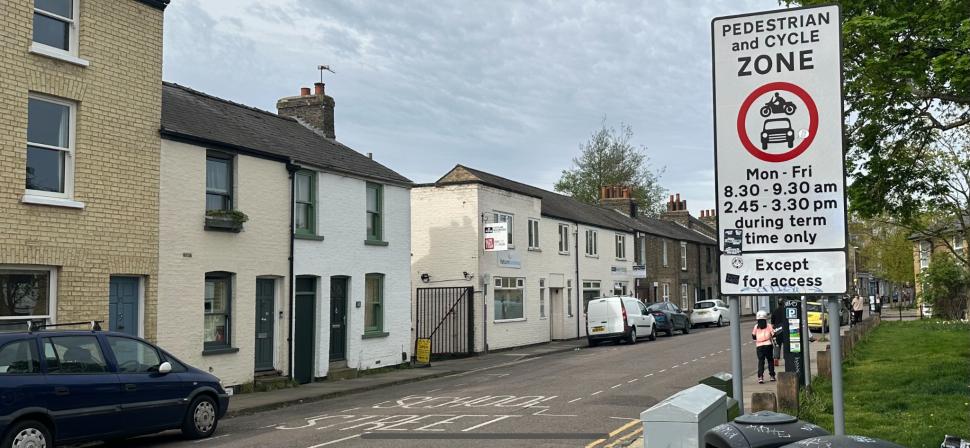- News
- Reviews
- Bikes
- Components
- Bar tape & grips
- Bottom brackets
- Brake & gear cables
- Brake & STI levers
- Brake pads & spares
- Brakes
- Cassettes & freewheels
- Chains
- Chainsets & chainrings
- Derailleurs - front
- Derailleurs - rear
- Forks
- Gear levers & shifters
- Groupsets
- Handlebars & extensions
- Headsets
- Hubs
- Inner tubes
- Pedals
- Quick releases & skewers
- Saddles
- Seatposts
- Stems
- Wheels
- Tyres
- Tubeless valves
- Accessories
- Accessories - misc
- Computer mounts
- Bags
- Bar ends
- Bike bags & cases
- Bottle cages
- Bottles
- Cameras
- Car racks
- Child seats
- Computers
- Glasses
- GPS units
- Helmets
- Lights - front
- Lights - rear
- Lights - sets
- Locks
- Mirrors
- Mudguards
- Racks
- Pumps & CO2 inflators
- Puncture kits
- Reflectives
- Smart watches
- Stands and racks
- Trailers
- Clothing
- Health, fitness and nutrition
- Tools and workshop
- Miscellaneous
- Buyers Guides
- Features
- Forum
- Recommends
- Podcast
 Chris Boardman at COP29 (Twitter/@Chris_Boardman)
Chris Boardman at COP29 (Twitter/@Chris_Boardman)Chris Boardman tells much-criticised COP summit that cycling's "superpower" can help tackle climate crisis, marks "first time" active travel "has actually appeared in a major platform" at the event
Chris Boardman made the case for cycling's "superpower" when he addressed COP29 this morning. However, the panel discussion came after a weekend bookended by serious concerns about the climate summit, notably as delegates were told to "cut the theatrics" and tackle the climate crisis, while a concerning report suggested that over 1,700 coal, oil and gas lobbyists had been granted access to the event.
Speaking as part of a panel on active travel's health and environmental benefits, and how best to implement change that is integrated with the wider transport network, Active Travel Commissioner Boardman suggested active travel had "been missing from the big stage" at COP as "it just seems so small and everyday", but added that that very same accessibility is its "superpower".
Acknowledging its absence from bigger discussions at the much-criticised climate summit, Boardman said: "I think it's amazing and really exciting that this is the first time that our lowest carbon form of transport has actually appeared in a major platform at COP. I think the reason it's been missing from the big stage is when you're facing a gigantic global problem, it just seems so small and everyday, but that's its superpower and why now is the time to tap back into that."
The summit in Baku, Azerbaijan, has been overshadowed by criticism, notably after the Guardian reported analysis from the Kick Big Polluters Out (KBPO) coalition which found that lobbyists for coal, oil and gas outnumbered the delegations of almost every country at the conference, and totalled at least 1,773.
Yesterday too, the UN's climate chief told COP29 that delegates need to "cut the theatrics and get down to the real business". Earlier this year, campaigner and author Jonathon Porritt suggested those "serious about climate change should boycott COP29".
In a more optimistic discussion, Boardman was joined by senior figures from across the world of active travel and public transport, as well as Mary Creagh CBE, the Labour MP for Coventry East.
Boardman outlined a personal "experiment" he ran in his former transport roles in Greater Manchester: "I thought I better make an effort, I'll try getting the train to work. So, luckily for me, I had a small path of six or seven kilometres and I rode to the station and after a few days, I thought, you know what, I'm going to make this a big experiment. I'm going to park the car and leave it there, and I did that for two months. After two months, I thought I'll sell the car because I can always just buy another one. Then that lasted for five years.
"Without that path, I would not have ridden to the station. I wouldn't have gone the road route, I wouldn't have mixed in with bleary-eyed drivers, sometimes really late at night or very early in the morning, I'd have been one of them. That path stopped me driving, not just to the station. I would have driven all the way to my office in Manchester.
"That's fourteen and a half thousand miles a year I wasn't driving. That's three tonnes of carbon every year. That's absolutely huge. While I'm doing that journey, I am looking after my own health, I am using public transport more because I didn't have a car, so not just for this journey but for other journeys."
A recurring theme of the panel was the need to integrate the transport network to enable active travel journeys around other forms of public transport, such as trains.
"There are three studies we've done that show good active travel infrastructure increases the catchment for public transport tenfold," Boardman continued. "That's huge, you're creating customers, a ready supply of customers for transport investments.
"So we then looked at what would happen if other people had the same opportunity that I did and how many of them are there out there in the UK, in the world for that matter. What would happen if other urban dwellers had the same choice?
"In the UK there are a little more than eight million households that have more than one car. And I'd stress that's not necessarily affluence at the moment, it's because people don't feel they have a choice. So even with small incomes they feel compelled to run two cars. So if they were able to make the same choice that I did that would be 17 million tonnes less CO2 every year. So you can see how this is suddenly becoming really significant.
"Then we looked at a recent study by Oxford University and that showed that if people switch just one trip a day from car driving to cycling or walking it reduces their carbon footprint by about half a ton a year. That's almost a 30 per cent reduction in transport-related emissions for an average UK urban resident. If one in five people did that across Europe it would cut emissions for all car travel in Europe by eight per cent.
"So, suddenly, active travel is starting to get really interesting. It is a big player on the decarbonisation stage and we've only just scratched the surface. What I've just illustrated, I hope, is that at the moment we are under-researching and under-considering active travel as part of the solution. We're the first generation to understand this problem and we are the last to be able to actually do something about it. It's a big responsibility and I think active travel has a large part to play in that."
Following his opening remarks, Boardman added that "there was definitely a theme about integration" and said "the words that kept popping up for me were easy and cheap".
He said: "At a national level we want decarbonisation, we want health, we want economy, but from an individual basis, which is where the change happens, it's easy and cheap. Integrated ticketing, multimodal, and I think that's a really important one to marry, that macro and the micro."
The point was echoed by Lucie Anderton, Director of Sustainability at the International Union of Railways who formerly worked at Network Rail in the UK.
"So many of the transport conversations at COP have been around [being] hard-to-abide by, the high-emitting modes, and they're forgetting the golden opportunities that are sitting ready to go in active and public transport. We have to really be an alliance, a coalition together and really sharing our messages," she said.
"The only way that trains are going to get their customers is if people get there, because unfortunately you can't take a train all the way in a door-to-door service. It never works that way so we have to think multi-modally and walking and cycling is really an excellent way for people to get to our stations.
"So I think our members are starting to wake up to this issue because from an operational point of view it can be difficult to get a bicycle on and off a train and so they have to really start thinking creatively about how we can do better in connecting and making it easier for people to use active travel to use passenger rail services."
She suggested that improving train design, station design, ticketing and rail company apps to improve the experience for people cycling to stations was an important next step.
"It just changed the whole framing and people understand and realise why this difficult thing is happening."
Boardman also took the opportunity to announce Active Travel England and the Department for Transport's new guidance to help councils deliver school streets that work for schools and local communities.
This refers to schemes that restrict traffic outside schools during pick-up and drop-off times, reducing congestion, boosting safety and enabling more pupils to walk, wheel or cycle.
Boardman told COP29 he had been "involved in the emotional side of this at a local level" and seen the vocal opposition to active travel schemes that is often seen from some in local communities.
"We've been doing a lot of focus group work on what plays with people and we've spoken to them about it," he explained. "[Telling people] it's worth £53 billion to the economy. Don't care, I'm trying to pay my mortgage. But, when we talked about kids having transport independence and the ability to stay at after school clubs, suddenly they were leaning in and were really interested.
"We were talking about the same thing but we were talking to the outcomes that they could connect to. When you're going to change the streetscape locally, don't give it an acronym that people can disassociate from emotionally and learn to hate. Call it a child safe zone. Then if you want to campaign against it, fine, but you're campaigning against a child safe zone.
"It just changed the whole framing and people understand and realise why this difficult thing is happening."
Dan is the road.cc news editor and joined in 2020 having previously written about nearly every other sport under the sun for the Express, and the weird and wonderful world of non-league football for The Non-League Paper. Dan has been at road.cc for four years and mainly writes news and tech articles as well as the occasional feature. He has hopefully kept you entertained on the live blog too.
Never fast enough to take things on the bike too seriously, when he's not working you'll find him exploring the south of England by two wheels at a leisurely weekend pace, or enjoying his favourite Scottish roads when visiting family. Sometimes he'll even load up the bags and ride up the whole way, he's a bit strange like that.
Latest Comments
- redhanded 1 hour 19 min ago
I had 2 bikes stolen from bike shed outside my flat in London last year. They ended up for sale in Russia. A cycling club I'm a member of tweeted...
- Deac 2 hours 20 min ago
I tried the footrest on the way home, it's a great idea, you can keep on the saddle making it easier to get away from the traffic lights, and being...
- mdavidford 4 hours 50 min ago
"Driver fined £100 after stopping to be sick" https://www.bbc.co.uk/news/articles/ce8g13pp0plo
- ktache 5 hours 14 min ago
Not that they would be as technical, or maybe quite as grippy, but does the skate industry provide any solutions?
- wtjs 5 hours 29 min ago
the Metropolitan Police contacted Vikash to inform him that they have created a report for the incident and that the video has been “passed to the...
- Rendel Harris 5 hours 56 min ago
Sorry to be a killjoy but it doesn't amuse me at all, I hope the idiot gets caught and punished. Putting yourself on the same road as pros...
- willpom @GWRaudax 6 hours 31 min ago
Steve Poulton has just published The Cheltenham Flyer - 10th May https://www.audax.uk/event-details/calendar/13235-cheltenham_new_flyer_200
- David9694 6 hours 48 min ago
Chef left with 'car sticking out of house' on crash-hit road...
- HKR 9 hours 42 min ago
It's not 4k though. It's a 4k sensor. But when image stabilization is on, that's chopped down to little over a 1080 image. ...



Add new comment
7 comments
Yeah, sure, cycling could help tackle the climate crisis, but it'd require average people, with average levels of laziness, to switch to a form of transport that requires some physical effort on their part. Couldn't we do something with tax credits instead? Or, better yet, blame the Chinese and Indians?
Good point - and then they won't even be buying fuel? Hmm... the boys over here have an idea about just making the the cars electric - that seems doable, people don't have to change much, we just need to legislate some new tax regime - not easy, but possible.
Or - keep the bikes, but they're electric, and people need to purchase a new one every few years because battery life / no agreed standards. That sounds more economically promising.
Meanwhile, average people with average levels of laziness: https://bicycledutch.wordpress.com/2017/06/06/the-busiest-cycleway-in-th...
It is interesting to wonder what the balance is; how much cycling reduces climate impact (replacing car journeys etc) and how much adds to climate impact (travelling to partake in cycling).
I suppose it's the difference between people who see cycling as a mode of transport and people who see cycling as a recreational exercise.
'Bike as vehicle' vs 'bike as toy'*.
*Yes, I know they can be both
Maybe cycling as mode of transport vs cycling as sport/hobby.
Again, they can overlap.
For the purposes of investment then cycling for transport, that also keeps/get you fit should be prioritised. However, there's an argument that if people are travelling to cycle for sport or as a hobby, that journey is most often instead of another journey for some other form of sport or recreation.
Ideally we'd have the rail infrastructure to allow more people to travel by train to get to their cycling holiday destination, but if they are strapping bikes to a camper van, is that much different/worse than most alternative holidays?
Sure. Like it's interesting to wonder about the driving for driving (track-days), driving for playing golf, driving for a ramble, driving for a pub, driving for the movies...
In other words: considering cycling as something that "adds to climate impact" is highly misleading, unless it's analysed and discussed very carefully! At the same time, the reduction of climate gas emissions is very real if cycling is used as a mode of transport.
(For a rough idea: 10km of driving/flying or 20km of public transport-use by an average person fills up roughly 1 square-meter of atmosphere - from ground to space - with the additional 100ppm CO2 that we consider as just about OK for 1,5°C.)